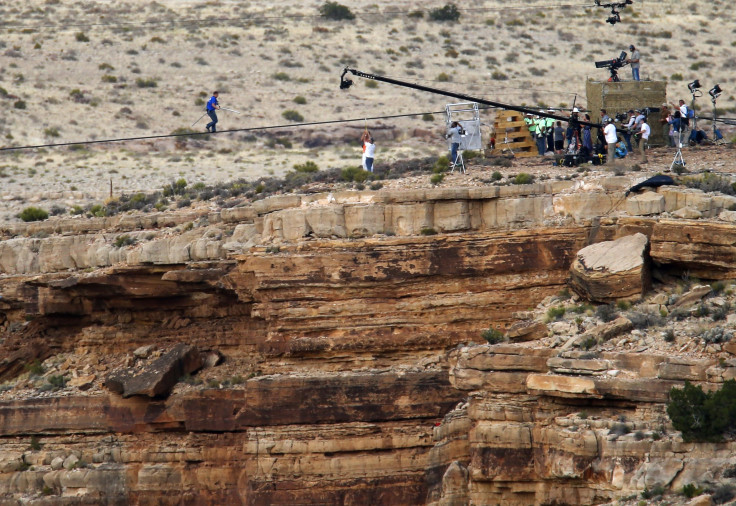How Nik Wallenda’s Tightrope Walk Benefits Navajo Nation, Angers Hopi

Let’s set the record straight: Nik Wallenda may have completed a death-defying tightrope walk Sunday night, but it wasn’t at the Grand Canyon, as the buzz may have led you to believe. Wallenda was actually on tribal land -- the Navajo Nation, to be exact -- and the Native American group has a lot invested in his big Discovery Channel-sponsored stunt.
The self-proclaimed King of the High Wire spent 22 minutes on a 2-inch-thick cable edging his way more than 1,400 feet across a gorge at Little Colorado River Navajo Tribal Park, several miles to the east of Grand Canyon National Park.
National Park Service officials made it abundantly clear over the past week that such a spectacle would never have been approved at the actual Grand Canyon. Representatives claimed events “must not unreasonably impair the park’s atmosphere of peace and tranquility,” noting that stunts “don’t meet that [criteria].”
Securing permission to perform the feat in Navajo Nation was no easy task, either. The Discovery Channel, NBC Peacock Productions and Wallenda all had to complete numerous forms, pay tribal land fees and apply for filming approval. The land clearances alone took more than 10 months to complete.
“Hosting an event of this caliber requires a lot of preproduction planning and approval,” Navajo Nation Parks and Recreation Department Manager Martin L. Begaye explained. He added that the park takes conservation very seriously. “As stewards of our land, we are working cooperatively with many individuals to ensure that we also preserve and protect our natural resources so that future generations will continue to enjoy our native homeland.”
As part of the deal, Wallenda and his team agreed to clean up the remnants of Philippe Petit’s unsuccessful attempt to cross the gorge in 1988. Petit, who gained international fame for his clandestine crossing of the World Trade Center in 1974, left behind concrete and wooden platforms as well as a cable dangling down the canyon wall.
The Navajo Nation stands to gain an unprecedented amount of publicity from the spectacular, both domestically and internationally, with the two-hour broadcast airing in more than 100 countries. Officials hope the increased attention will allow them to create more Grand Canyon-like activities. Moreover, a new paved road and parking lot, paid for by NBC, will help drive visitation to what was once a largely inaccessible area.
Navajo Nation Park Manager Helen Webster called hosting the event a dream come true. Webster is credited with transforming Little Colorado River Navajo Tribal Park from a barren stretch of land in 2006 to a visitor-friendly attraction with signage, trails, fencing, picnic tables and restrooms. Wallenda’s stunt could help her to fulfill a long-term goal of having state-of-the-art infrastructure and facilities to create an even more accommodating atmosphere for visitors.
“I have been praying for improvements to Little Colorado River Navajo Tribal Park ever since I started,” Webster said, adding that the new road was nothing short of a miracle. “It is amazing to know just how many people from throughout the world will be able to catch a glimpse of our beautiful Navajo culture. After they see the video, I hope they will want to visit the Navajo Nation.”
Such spectacles are rare on tribal lands and the OK by the Navajo angered the nearby Hopi, who believe the site to be of deep sacred importance. They said they were never consulted about the stunt, despite a 2006 agreement between the two tribes to honor each other’s cultural and religious sites.
“The Gorge and the Canyon are not about taking lives,” Leigh Kuwanwisiwma, director of the Hopi Cultural Preservation Office, told the news outlet Indian Country Today. “We were told that this guy is not wanting to wear a safety harness. What if he does fall? It’s another cultural dilemma for the Hopi people.”
The death of a base jumper in the area last year due to parachute failure presented a cultural burden to the Hopi. They found the Discovery Channel’s promotional lines calling Wallenda’s attempt “nail-biting” and “one of the most daring and captivating live events in history” offensive, and they staged a small protest Sunday in the town of Cameron, Ariz.
Follow me on Twitter @MarkJohansonIBT
© Copyright IBTimes 2024. All rights reserved.






















